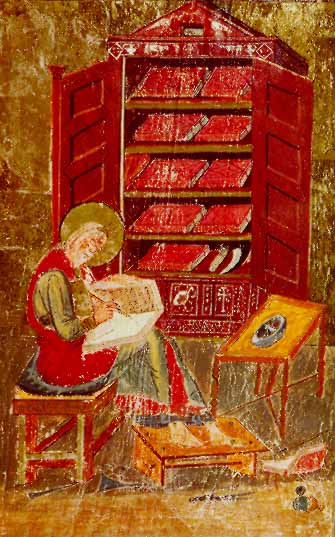Knowledge with Zeal: Biblical Examples of Using God-Anointed Intellect in His Service
Ezra

“When the sacred books had been consumed in the fires of war, Ezra repaired the damage.”
Codex Amiatinus, 8th Century. Image: Wikimedia Commons
Ezra was a Levite who could trace his lineage all the way back to Aaron, Israel’s first high priest. He was “learned in matters of the Law,” (Ezra 7:1-6, 11) leaving little doubt that he was numbered among the intelligentsia of the day. How he was educated is a matter of conjecture. Most scholars believe that the institution of the synagogue was founded during the Exile as Jews could no longer worship at the temple. It may be that he was raised in a synagogue school and perhaps later trained under an individual teacher of the Law. Whatever the case, he was of such high and noble character that he even commanded the respect of the pagan king of Persia, Artaxerxes (Ezra 7:12).
Originally, the function of the scribe may have been part of the job of the Levities in the early history of Israel, and court scribes certainly served in the times of the monarchy. But scribes as a special class began to emerge in the period of the Exile, meaning that Ezra was part of a new breed (see Ezra 7:6, 11; Nehemiah 8:4, 9, 13). Ezra was trained in what is now known as Rabbinic Judaism which emphasized the study of the law—a written tradition that needed interpretation.13 Because of his skill in interpreting the Law and his priestly lineage, Ezra symbolizes the close relationship between the priesthood and the interpretation of the Law that was common in the post-exilic period.14 His literary skills can be seen in the book that bears his name. Many of the early church fathers also believed that he wrote the books of the Chronicles, although the evidence is not conclusive.15 It has also been argued that he may have written all or part of the book of Nehemiah.16
But Ezra was no ivory tower scholar. Not only had he served in the court of Artaxerxes, he also served as a civil leader who led a part of the Jewish remnant from Babylon back to the promised land in 458 B.C. (Ezra 7:6). Although acting in an official capacity, he surely would have understood the return of the remnant in light of Jeremiah’s prophecy (Jeremiah 25:11) that the Jews would return after seventy years. Certainly he would have seen himself as part of that prophecy’s fulfillment.
What he saw when he arrived in Jerusalem shocked and disturbed him greatly. In clear and open violation of the Law of Moses, the children of the Jews who had been left behind seventy years previously had intermarried with peoples among whom the Law had expressly forbidden them to marry (Ezra 9:1-2; cf. Exodus 34:15-16). His prayer in Ezra (9:6-15) is one of contrition and repentance on behalf of those that had sinned. The picture of one of the most dignified, well educated Jews of his era sitting before God weeping with his clothes torn in repentance is most poignant (Ezra 9:5; 10:1).
As a true son of the covenant, Ezra could not be satisfied to leave things the way they were. With the encouragement of Shecaniah, Ezra began to lead the people back towards faithfulness to God (Ezra 10:2-5). Faithfulness to God demands obedience, and Ezra issued the call for them to divorce their foreign wives (Ezra 10:6-17). This proved to be a difficult task as their sin had been so rampant. While Ezra had rightly called them back to obedience, he tempered it with mercy in allotting some time to work out the issue. The melding of the intellect and piety of this marvelous man is found in Ezra 7:10 that he purposed to study, practice, and teach God’s law.
Category: Biblical Studies, Spring 2008


